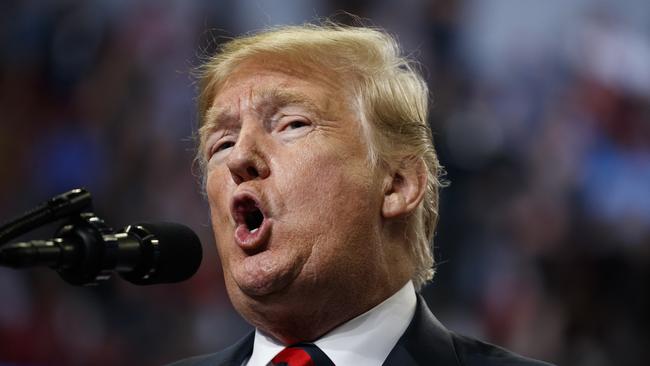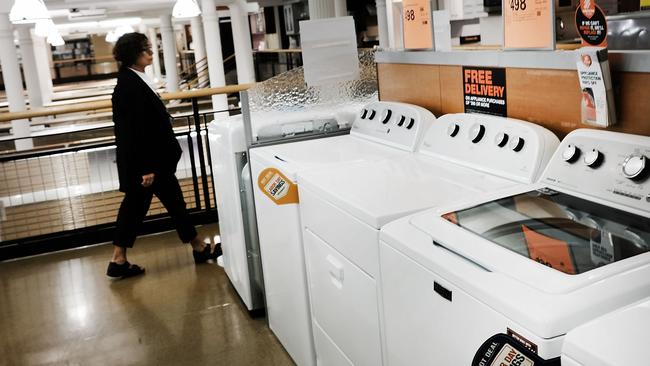Donald Trump’s China tariffs are really aimed at US companies

Meanwhile last Thursday, the US State Department said it was imposing sanctions on the Chinese Central Military Commission for “engaging in significant transactions” with a group in the Russian defence sector that is on a list of black-listed entities.
That has outraged Beijing, where the Ministry of Defence has called it “a flagrant breach of basic rules of international relations”.
In retaliation, they have cancelled a September meeting on joint staff communications and recalled a Chinese naval commander who was in the US at a naval conference.
Tensions are rising, and the trade war between America and China is looking less and less like the fulfilment of Trump’s election promises on trade, or an effort to get China to the negotiating table, and more and more like an attempt to disrupt global supply chains, targeted not at China, but at US companies dealing with it.
An alliance of the American military establishment and Republican trade hawks wants to break up the connections that have become embedded between US companies and China, as part of an attempt to prevent China gaining economic, geopolitical and technological predominance.

Today’s tariffs are being imposed under Section 301 of Trade Act 1974, which authorises the President “to take all appropriate action, including retaliation, to obtain the removal of any act, policy, or practice of a foreign government that violates an international trade agreement or is unjustified, unreasonable, or discriminatory, and that burdens or restricts US”.
But the tariffs are almost certainly in breach of WTO rules, notwithstanding six weeks of consultations and six days of public hearings, and are clearly not the way to get China to change its ways.
George W Bush and Barack Obama were working far more effectively to do that through the Trans Pacific Partnership, which Trump pulled the US out of as one of his first acts as President. Trying to stop illegal practices by doing something illegal yourself is clearly not going to work.
Here are the four grounds listed in the US Trade Representative release for the tariffs that came into effect at 12am Monday, Washington time:
* China uses joint venture requirements, foreign investment restrictions, and administrative review and licensing processes to require or pressure technology transfer from US companies.
* China deprives US companies of the ability to set market-based terms in licensing and other technology-related negotiations.
* China directs and unfairly facilitates the systematic investment in, and acquisition of, US companies and assets to generate large-scale technology transfer.
* China conducts and supports cyber intrusions into U.S. commercial computer networks to gain unauthorised access to commercially valuable business information.
This are not the words of a government simply trying to negotiate a trade deal.
Almost all of the 5,745 items on the list are inputs for companies to make other products, which leads to the conclusion that they are aimed at forcing those American companies out of their supply chain linkages with China and encouraging them to go elsewhere – anywhere will do.

If I’m right, there are two very big problems for Australia:
* This will take a long time – there will be no quick end to the trade war, especially if Trump runs in 2020 and wins (two big “ifs” admittedly). In any case the anti-China forces in the US run deep and populate both sides of politics, so it’s possible that even if Trump is impeached before Christmas this year, nothing will change.
* The interdependence of the American and Chinese economies that has developed since Nixon went to China in 1972, and was turbocharged when China joined the WTO in 2001, has been fundamental to Australia’s – and Asia’s – economic growth for 20 years. Much of the iron ore and coking coal exported from Australia to China ends up in America, or else in housing for Chinese workers who make stuff for the American market. More fundamentally, America’s patronage has it made it easy – even irresistible – for China’s post-Mao leaders to open up the economy and to become a constructive part of the global geopolitical system. Ending this commercial relationship could have enormously unpredictable and negative results, including on global security, not to mention the Australian economy.
None of this will play out quickly. The US economy is booming so there is little incentive for the Trumpsters Union to pull back and although the tariffs will probably hurt China’s economy a bit more, the damage to them can be offset through further devaluation of the yuan and some fiscal stimulus (although they are reluctant to stimulate because they’re trying to reduce debt).
Beijing is digging in, settling in for a long siege because they believe – rightly in my view – that America’s aim is not to simply persuade them to change its trade policies, but to slow and possibly reverse China’s ascent.
Not only will that not work, the attempt will be destructive and the consequences unpredictable.
* Alan Kohler is Publisher of The Constant Investor



As Australians tuck into their lunches today, the clock in Washington will tick over to midnight and 5,745 imports from China, worth $US200 billion, will suddenly go up in price by 10 per cent because of a new tax, otherwise known as tariffs.